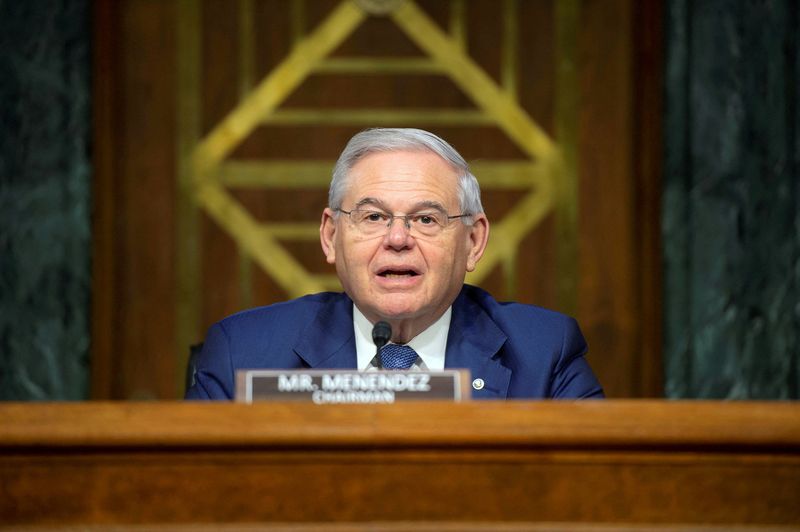By Michael Martina and Patricia Zengerle
WASHINGTON (Reuters) -A duo of U.S. senators introduced a bill on Thursday to significantly enhance support for Taiwan, including provisions for billions of dollars in U.S. security assistance and changes to the decades old law undergirding Washington's unofficial ties with the Chinese-claimed democratic island.
The United States, which accuses China of ramping up military coercion toward Taiwan, is its main supporter and arms supplier, a point of increasing friction between Washington and Beijing, whose relations are already at their lowest point in decades.
The senators' Taiwan Policy Act of 2022 threatens severe sanctions against China for any aggression against Taiwan, and would provide $4.5 billion in foreign military financing over the next four years, as well as designate Taiwan a "major non-NATO ally," according to the text.
The sponsors, Senate Foreign Relations Committee chairman Bob Menendez, a Democrat, and Republican Lindsey Graham, said it would be the most comprehensive restructuring of U.S. policy toward Taiwan since the Taiwan Relations Act of 1979 - the bedrock of U.S. engagement with the island since Washington opened up relations with China that year.
"As Beijing continues to seek to coerce and isolate Taiwan there should be no doubt or ambiguity about the depth and strength of our determination to stand with the people of Taiwan and their democracy," Menendez said in a statement.
He said the bill sent a clear message that China should not make the same mistakes Russia made in invading Ukraine.
"The danger will only grow worse if we show weakness in the face of Chinese threats and aggression toward Taiwan," Graham said. Senate aides said the pair hoped to have the committee vote to send the bill to the Senate floor as early as next week.
Washington and Beijing have stood firm on their opposing views about Taiwan's right to rule itself.
"If the U.S. insists on taking actions that will harm China's interests, we are compelled to take resolute countermeasures," Liu Pengyu, spokesman for China's embassy in Washington, said in response to a question about the bill.
UNEASY
One U.S. official familiar with the bill said some of its elements made President Joe Biden's administration and the State Department uneasy given concerns it could antagonize China.
Any legislation would also have to pass the House of Representatives, and another expansive bill intended to boost U.S. competitiveness with China has been languishing in Congress for months.
The White House and State Department did not respond to a request for comment.
Should it become law as currently written, the bill would "prioritize and expedite" arms sales to Taiwan until Congress determines the threat to the island has significantly abated, as well as direct the Secretary of Defense to establish a training program to increase Taiwan and U.S. armed forces interoperability.
The U.S. president would be required to impose sanctions on Chinese officials, including its president, in response to "significant escalation in hostile action in or against Taiwan", such as undermining or overthrowing Taiwan's government or occupying the island.
It would amend parts of the Taiwan Relations Act, including by adding that U.S. arms provisions to Taiwan be "conducive to deterring acts of aggression" by China.

It would also push the State Department to seek negotiations to rename Taiwan's de facto embassy in Washington to the Taiwan Representative Office, and would elevate the role of Washington's top official in Taiwan by requiring Senate confirmation for the post.
Beijing has never renounced the use of force to bring Taiwan under its control, and Chinese Defense Minister General Wei Fenghe last week said China's military "would have no choice but to fight at any cost and crush any attempt of Taiwan independence."